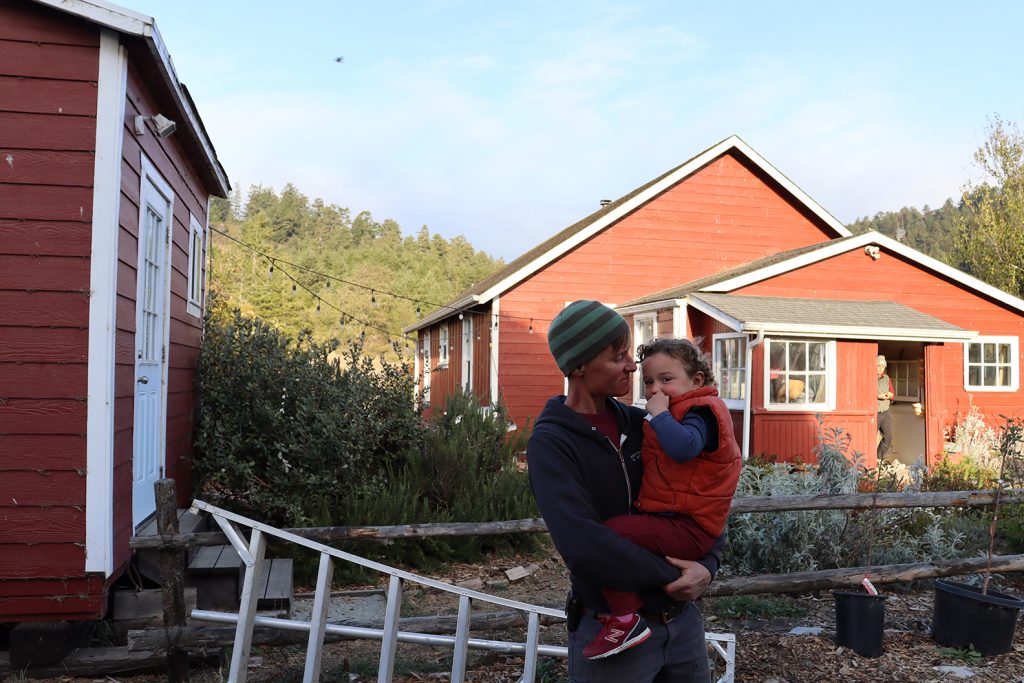
Given the unpredictability of the pandemic, they hadn’t known whether turkey sales would be better, worse, or the same as usual, said the farm’s owner, Dede Boies, who raised about 200 turkeys this year.
Boies noted that a change in the ordering procedure might have affected the speed of sales—Root Down posted their order form later this year than in the past, perhaps giving customers a sense of urgency when it went up. But either way, Thanksgiving sales remained strong despite her initial worries.
“I was afraid that we’d be sitting on a bunch of turkeys come January,” Boies said, “But at this rate, I don’t even know if we’ll have one for ourselves.”
Uncertainty hangs over this year’s holiday preparations. Farmers and grocers were unsure what the demand for turkey and other Thanksgiving staples would look like given limits on indoor gatherings and the economic stress many Americans currently face. And since turkeys take anywhere from 14 weeks to seven months to grow large enough to be sold for meat (depending on their breed and eventual size), farmers had to make their best guesses months ago as to how many customers would buy.
“We were pretty nervous these last few months because if we don’t sell them by Christmas, then nobody wants turkey after,” Boies said. “It’s this weird thing.”
Farmers could breathe a sigh of relief this month as turkeys sold after all. Like Root Down Farm, larger producers have been reporting good early sales numbers, according to representatives from Foster Farms and the National Turkey Federation.
Not a fowl year for the turkey business after all
Circumstances related to the pandemic—CDC warnings against travel, limits on indoor events, and an economic downturn—caused early worry for turkey sellers.
Current CDC guidelines for holiday gatherings recommend “having a small dinner with only people who live in your household” or “having a virtual dinner” as more COVID-safe alternatives to large Thanksgiving meals. Anthony Fauci, director of the National Institute for Allergy and Infectious Diseases, said in October his own adult children would be skipping their Thanksgiving visit this year in order to reduce the risk of travel-related virus transmission.
Luckily for turkey farmers, however, their fears of low sales decreased somewhat as Thanksgiving approached.
“Early sales have been strong,” said Beth Breeding, vice president of communications and marketing for the National Turkey Federation, although she added she did not have specific data.
Ira Brill, vice president of communications for Foster Farms, which sells poultry to major regional grocery chains including Kroger and Albertsons, also hasn’t noticed a major change in turkey demand.
“I think what you’re seeing is there’s probably a preference for smaller turkeys given the COVID-19 situation and the CDC encouraging smaller gatherings,” Brill said.
People may be eating Thanksgiving dinner in smaller groups this year, farmers and grocers theorized. Survey results support this idea; just 29% of consumers will host or attend a meal with visitors from their extended family in 2020, down from 48% last year, according to a November press release from data analytics firm IRI.
Turkey producers dealt with uncertainty all year
Turkeys take up to seven months to grow to the hefty 25 to 30 pounds common on Thanksgiving tables. Yet back in the spring and summer, no one knew what the state of the pandemic might be like this fall.
The uncertainty caused stress for small operations like Root Down Farm, which has been open just seven years and had to quickly figure out how to adapt. Customers typically buy Thanksgiving turkeys by weight, so in order to produce the smaller turkeys they anticipated demand for, Root Down Farm “harvested” and froze their birds earlier than usual.
This year’s unpredictability also challenged large sellers like Foster Farms, whose size makes it hard to change plans at the last minute. Foster Farms starts scheduling holiday production the winter beforehand.
“We’re really beginning to plan in January,” Brill said. “Most of the large producers have a planning cycle and the planning cycle was in effect really before COVID-19.”
He added that fortunately, Foster Farms did not seem to have ended up with an excess or a shortage.
Like Root Down Farm, changing the timing of the harvest is a way other producers determine the size of their turkeys, Breeding said. She added that farms anticipate an increase in demand for turkey breast and other parts rather than whole birds this Thanksgiving.
A spokesperson for Sprouts supermarket said their 10-to-12-pound turkeys have been popular recently.
Thanksgiving remains a time of culinary tradition in 2020
Palo Alto businesses described customers’ desire to stick with traditional holiday meals, just on a smaller scale.
“We’ve been doing a few personal orders,” said Redwood Catering office manager Gina Marines. “It’s different from other years, when we’d cater for private events and holiday corporate lunches.”
Marines said the caterer’s overall business is down 75% this November compared to the same time last year, largely due to losing corporate events and big parties, but small orders continue to come in. Larger groups also used to generate revenue with elaborate orders including multiple entrées, she said. This year, customers are “sticking with the basics—turkey, mashed potatoes, green beans, pumpkin pie.”
Still, much about Thanksgiving is expected to remain the same as usual this year, at least when it comes to the types of food on the table.
“Folks need something to look forward to this year,” said Beth Breeding.
In a year of change, tradition may bring comfort.
